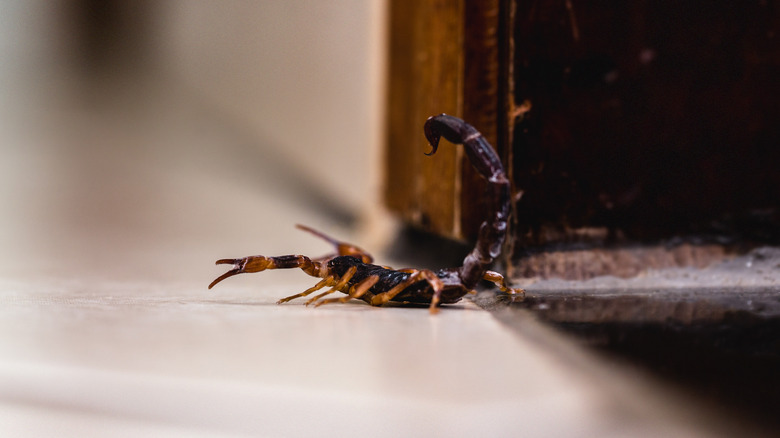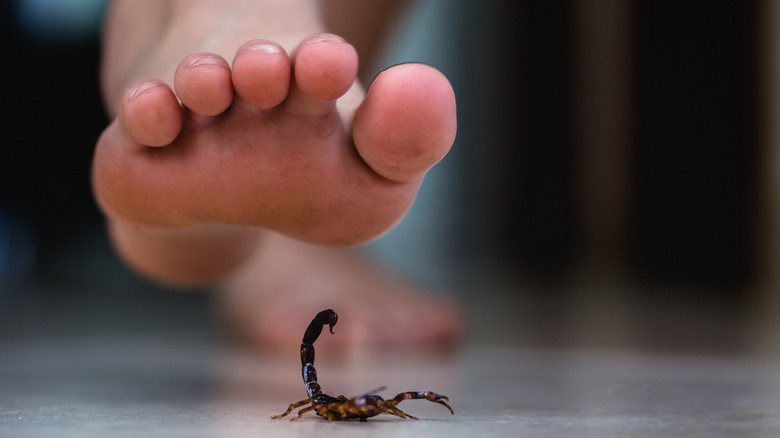The First Thing You Need To Do If You Find A Scorpion Crawling Around Your House
If you discover a scorpion in your home, the steps you should take next are largely determined by your familiarity with these creatures. Staying calm is vital if you're a novice with little experience. Grab your phone immediately and call a professional pest control service. Safety should be your main focus — now's not the time for DIY bravery, as mishandling the creature could result in a harmful sting.
When you speak to the pest control service, offer as many details as possible. Given the varying degrees of risk associated with different scorpion species, proper identification is crucial in determining the appropriate course of action. Clearly communicate the color, size, and precise location within your home where you spotted the intruder. By providing thorough information, you're helping professionals make an accurate risk assessment to formulate the safest and most effective plan for eradicating the scorpion. If you can safely manage it, capturing a photo of the intruder can further assist experts in making a precise identification, facilitating a more targeted treatment.
If you've dealt with scorpions before, you may feel inclined to handle the creature independently. Nonetheless, extreme caution and thorough preparation are paramount. Always keep in mind that, even with prior experience, unforeseen challenges could arise. Therefore, make sure you're well-equipped and vigilant, and consider having a backup plan involving professional help.
Capturing the scorpion safely
When catching a scorpion, start by preparing your essential tools: a sturdy broom and deep container or dustpan. These should always be within easy reach, particularly in hotspots like your kitchen or attic. Now, slip on a pair of cut-proof gloves for an added layer of protection and approach the scorpion cautiously before sweeping it into a deep container or your dustpan. Your main goal here is to avoid direct contact with the creature at all costs — minimizing physical interaction is the key to reducing your risk of a painful or even dangerous sting.
If a scorpion is on your wall, you can swoop it directly off. But be aware, it might fall and disappear from your view. Don't panic; there is a tool that can help. If you live in an area prone to scorpion activity, always keep a UV flashlight within easy reach. It not only illuminates the hidden world of these stealthy creatures, but it also grants you the visibility and confidence to regain control of the situation. By making the scorpion glow under UV light (thanks to a substance found in their exoskeletons), you can easily locate and safely trap the evasive arachnid. Once you've securely trapped it in your container, your next step is to cautiously take it outside for release.
Preventing future encounters: making your home scorpion-proof
The battle isn't over once you've dealt with the immediate threat. The next step is prevention. Scorpions are experts at finding small openings in structures and can flatten their bodies to pass through even the tiniest holes. That's why your first course of action is to scorpion-proof your home by checking for cracks, holes, or other potential entrances. Pay attention to areas like weep holes and install mesh or a protective wire shield. This will elevate your home's defenses, making it considerably more difficult for these unwelcome guests to breach your sanctuary.
The yard surrounding your home also serves as a crucial battleground in your ongoing war against scorpions. A thorough cleanup operation is ideal to make your property less attractive to these creatures. Remove all forms of clutter, garbage, debris, or yard waste, as these provide convenient hideaways. Pay special attention to areas close to your home's exterior walls. If you absolutely must store items like firewood, don't place them too near your home — ideally, store them about 30 feet away. This buffer zone creates an added hurdle for these stinging pests, reducing their chances of returning to your house.


